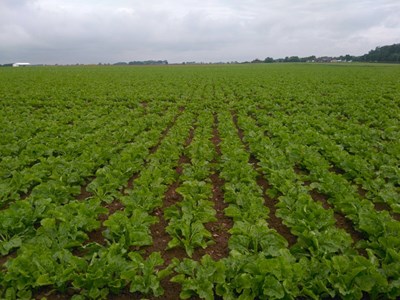Later planted crops and those struggling in poorer seedbeds are playing catch up but most have rapidly developing canopies and are recovering from a slow start. However, variable plant populations and patches of delayed emergence are typical of many crops, reflecting soil type differences and underlying soil issues such as compaction. Headlands seem particularly slow in some crops.
Plant populations
As plants pass through the 6-leaf stage it is worth taking some plant population counts, to see how close you are to the target of 100,000 per hectare. There is a guide on how to do this in the BBRO Sugar Beet Reference Book which is also available on the publications section of the BBRO website.
Remember to make your counts at several representative areas of the field including at least one
headland count.
Winged peach-potato aphids
Increasing numbers of winged peach-potato aphids have been caught across the four factory areas in the yellow water traps, particularly at Fulbourn, Cambridgeshire (520) and Holme, Spalding Moore (319). Seed treatments should continue to work for this pest but remember there are no foliar sprays currently available. Increasing numbers of beneficial insects could be found when assessing the aphicide trial at Morley. Black aphids are starting to make an appearance too.
More information in the Advisory Bulletin No 6




